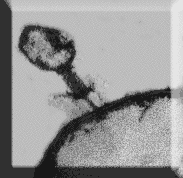
Microbial Ecology
Winter
2004
LH2 Wednesdays,
6-9:45
Syllabus |
Class Links |
Images |
Evergreen Phage Page |
Contact Info |
Texts: Brock Biology of Microorganisms -- Madigan et al. -- 10th edition -- this book is expensive but very well done and will also be an excellent resource for more specialized topics well into the future
The Killers Within - Shnayerson and Plotkin
Planned activities include:
Illustrated lectures on broad ideas and patterns
Readings-based small- and large-group discussions of basic concepts in
microbiology and microbial ecology, including important experimental techniques
-- using books and handouts
Talks on such topics as archae (those microbes that grow under greater
extremes of temperature, pH, etc.), biofilms, fish pathogens, gut microbiology,
E. coliO157, role of bacteriophages in maintaining microbial balance in
nature, and other topics of special interest to the group
Student-researched presentations on case studies and/or microbes of particular
interest. Presentations will take place primarily during the last 4 weeks
of the quarter, and students will be encouraged to work in pairs in carrying
out the research and presentations.
Syllabus - Microbial Ecology - draft as of Dec. 2, 2003 - |
||
This will be finalized in conjunction with the class, reflecting their particular needs and interests, and will include both student and faculty presentations. |
||
Week |
Topics and Activities |
Readings |
| In Brock unless otherwise specified. | ||
|
Week 1 |
Discussion groups: how do you see
microbial ecology as being relevant in your life and work? What
are some of the key questions you would like to explore this quarter?
We will use your discussion here, along with information on the
backgrounds of everyone in the class, to revise and complete the
syllabus. |
The Microbial World -- general overview, roles on our planet, history of life Brock xxi-37; 322-329 |
|
Week 2 |
Microbial ecology: -- further defining the questions: |
614-629, 633-643,330-344; |
|
Week 3 |
Microbial molecular genetics: (much of this should be review for many of you, so you will be at different places on the "spiral of learning", but the concepts are crucial.) Workshop on basic molecular principles |
39-53, 168-192, 312-318 |
|
Week 4 |
** how much more deeply we go into the physiology and energetics will depend on the background and interests of the group; we may well set it up for students to work at a couple of different levels depending on background, and/or for students who have had Molecule to Organism to do parts of these presentations. |
Basic microbial structure and physiology 59, 64-110; |
|
Week 5 |
|
Carbon cycle: 652-662; Plant interactions: 679-694 |
|
Week 6 |
|
Essentials of Viruses and Phages: 232-262 |
|
Week 8 |
|
|
|
Week 9 |
|
|
|
Week 10 |
|
|
|
Evals |
|
|